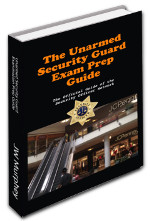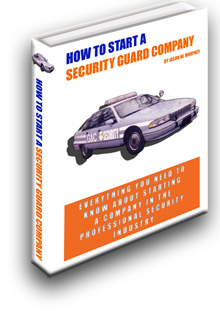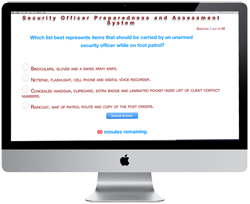 Practice Test
Training
Regulations
Security FAQs
Member Support
Sign In
Join
Practice Test
Training
Regulations
Security FAQs
Member Support
Sign In
Join

LAST EDIT July 13, 2023
Should Security Officers Use AI When Writing Incident Reports?
Listen to Content From This Article.
New artificial intelligence technologies are set to impact every area of life. The technology is credited with being a foremost reason for the stock market's 2023 gains and you've probably seen the hype: From lawyers using AI to file court papers to doctors using it to diagnose medical conditions.
But, here's a crucial question: Is it acceptable for you, as a security officer, to use this new, amazing technology to develop your incident reports? Really, I need to know...
If you've been following this site, you will know that we're extremely bullish about the future of the private security industry.
The unfortunate deterioration of societal norms creates a unique opportunity for the private security sector. However, this comes with a significant challenge. A leading cause of this societal collapse is arguably the deterioration of our education system. Unfortunately, this same failing education system is also responsible for training the security officers of the future, who will be tasked with responding to the societal breakdown. The crux of the matter is that many security professionals struggle with writing clear and comprehensive incident reports -- they simply weren't taught to write well, in school.
Incident report writing is the critical process that enables the "observe and report" strategy. Without the "report," does it even matter to "observe?" Without a well-written report, District Attorneys (DAs) cannot confidently move their cases to court. Consequently, this hampers the ability to effectively deter criminal activity.
In May, Time Magazine highlighted frustrations from government officials because district attorneys found that arrest reports and citations issued by security officers were -- "not usable."
This finding certainly won't surprise those who have worked in the industry and seen the reports by their colleagues; some of them, just can't write.
The most significant distinguishing factor between a professional and a non-professional officer is report writing. If I were a hiring manager and needed professional officers right away, i.e., I didn't have time to train them, I would ask them to watch a video of a security incident and write an incident report. A quick scan of their report would instantly reveal their capabilities.
This is where AI holds significant promise. It has the potential to transform just about any incident reports from substandard, ineffective narrative into professional, clear, and detailed accounts that can impress a DA, a judge, and a jury.
The officer could paste his badly written prose into the AI web interface, instruct the AI to turn it into a professional incident report, that meets criteria and seconds later, there it is!
But is it a good idea?
I ask this not as a rhetorical question, but as a genuine invitation for your input. As the editor of the curriculum used at IncidentReportWriting.com., as we prepare for the next revision of the curriculum, it's time to decide how to handle this matter. Should students be encouraged to use AI to improve their reports? Share your thoughts in the comments.
Let me share my current thoughts.
The potential of AI excites me: especially as it could help students who can understand the technical aspects of writing an incident report - the requirement for a credible, consistent narrative describing the who, what, when, where, and how of the incident; yet, they may struggle with writing for various reasons - English as a second language, the damaging effects of years of participating in casual text language on formal writing, or simply a lack of writing skills, per my earlier critique of the education system.
So, should I suggest those with inadequate writing skills use AI? After all, students are currently taught the importance of using a spell checker to ensure the absence of spelling errors. If they are already using automated quality controls such as this, is AI any different?
Of course, you can already predict where this is going.
While I believe AI can address various challenges in society and improve reports across many industries, public safety is a unique field. The reports of a security officer could mean the difference between a subject's freedom and his incarceration. Given the crucial role of these reports in the integrity of our justice system, the use of AI could cast doubt on the report's veracity, which could potentially sway a jury.
If I were a defense attorney, in each and every case involving an official report, I would try to determine if an officer used AI to aid in his report. I would then proceed to question its reliability, including AI's potential alterations and impacts on the report's accuracy.
I would find all public instances of AI errors or misinterpretations, such as the recent news story describing how a lawyer went to court with an AI-generated briefing only to later find out that the report falsely referenced non-existent cases. If I could, I would find a way to get these abuses on the record and cast doubt on AI's reliability; and, I wouldn't be wrong to do so.
So, if AI made this big of a mistake, as featured in the national news media, then how can we trust the freedom and liberty of my client to a report, the factual content of which was perhaps altered by AI, an alteration that might now, months after the incident, could be influencing the memory of the officer on key points of the narrative. Surely, the use of such an unproven technology will at the very least introduce a reasonable doubt as to the defendant's actions and this means only one thing: an acquittal.
So, with these cautionary thoughts in mind, here's my current position. Again, I am soliciting your feedback. I believe there's a role for AI. However, this role should be limited and only as really needed. Skilled writers, ideally, won't need to use AI, which is our end goal. It's better not to take the risk in the first place. Think of AI like training wheels on your bike, if you MUST have training wheels to keep from falling over and injuring yourself, then fine; but, if you can ride a bike without training wheels, of course that's what you will do.
So, maybe the officer is a poor writer and still needs the training wheels; in this case, I suggest that it's acceptable to use AI to identify shortcomings, thus allowing the officer to improve his report and learn for next time. However, he must limit AI's input to suggestions for improvement and should never allow AI to directly edit the report.
Let's examine the difference.
Here's the right way to structure an AI prompt.
"I am a security officer. I just witnessed an incident and am writing an incident report on the matter. My report must be in the first person, provide a who, what, when, where and how of an incident, utilize the past tense, be free of law enforcement jargon, contain only facts not opinions and clearly communicate the specifics of the incident so as to meet legal standards. Please review my first draft of the report for grammar, spelling, and objective voice. Also, provide a list of grammar correction suggestions for clarity. Please make your recommendations for improvement in a list format. Do not edit the report."
This contrasts with the wrong way to prompt AI. A problematic prompt might go like this: "please edit this incident report so that it will hold up in court."
See the difference?
The first prompt will do better under scrutiny, provided that the officer preserves the prompt and the edits and can explain any changes made based on AI feedback. The component of the prompt that states, "Do not edit the report!" makes it clear that AI was not involved in inserting any hallucinated details and couldn't have impacted the report.
The first prompt allows AI to generate a list of suggested edits, which the officer may or may not include in the final draft. The officer should preserve this list of edits, along with his original draft for future reference. The second prompt allows AI to directly edit the report and thus potentially destroy its credibility in the eyes of an objective observer.
These are my thoughts as of this moment. But please provide yours. This is a new, fast-moving area of policy with tremendous potential to help many, many security officers. It's an exciting time to be alive but navigating these issues will require a lot of wisdom and experience.
What do you think? Is AI a tool or a liability? If you are a supervisor, how are you instructing your officers on this? Let us know in the comments. Your comments could play a major role in the next revisions of the PSIR report writing curriculum.
If you want to demonstrate or improve your report writing skills, check out IncidentReportWriting.com. It employs the PSIR curriculum as an excellent tool to certify your mastery of this critical skill—without a doubt, one of the most important skills you should master before considering yourself to be a true security professional. Upon course completion, you will receive credit for this certificate in your Security Officer Network membership account, if you are a network member.
And, of course, if you have yet to join us at TheSecurityOfficerNetwork.com, consider this as your invitation to join the professional security officer's status symbol of choice. Portfolio your experience, and earn more as you impress your future employers and clients.
Are you ready to start thinking about starting your own security company? Check out this 140 page ebook from The Security Officer Network entitled "How to Start A Security Guard Company". Get your PDF copy while it is still free! Or, order the paperback from Amazon.
How Much Does it Cost to Start a Security Guard Company - The initial investment that should be set aside before start a private security agency. Click to Read
How Much Can a New Security Agency Charge? - The new security agency's pricing strategy. Click to Read
What are the Components of the Security Guard Company Business Plan - The necessary elements of the Security Guard Company's business plan. Click to Read
How to Lower the Cost of the Securty Guard Company's Insurance Premiums - Methods for cutting the cost of insurance and undercutting the price model of the big security companies. Click to Read
How Much Should a Company Charge for Security Patrol? - Methods for charging for patrol route services. Click to Read

SecurityOfficerHQ.com is the exclusive provider of this free 57 page PDF guide. It features just about everything you need to know before taking the exam and includes The Professional Security Officer eCourse. You may get your copy for free right now only at SecurityOfficerHQ.com! Submit your name and email to receive your copy via email or click here to learn more about this guide.

SecurityOfficerHQ.com is the exclusive provider of this free 140 page PDF ebook. Less-comprehensive versions sell for $24, but, for the time being, you may get your copy for free right now only at SecurityOfficerHQ.com! Submit your name and email to receive your copy via email or click here to learn more about the book.

The forty question, free practice exam will test your unarmed security knowledge. It's the perfect test prep for those who must sit an exam before getting licensing.

This free job interview guide is the security officer's must-have resource. Get yours here.
© 2012 - 2026 The Security Officer Network
A Product of the 1918 Media Limited Liability Company
Addr: Thirty North Gould Street 2288
Sheridan, Wyoming 82801
Phone: (307) 461-6079
Red Hirundo Rustica Custom CMS and Testing Engine
Disclosures | Privacy | 307.461.6079